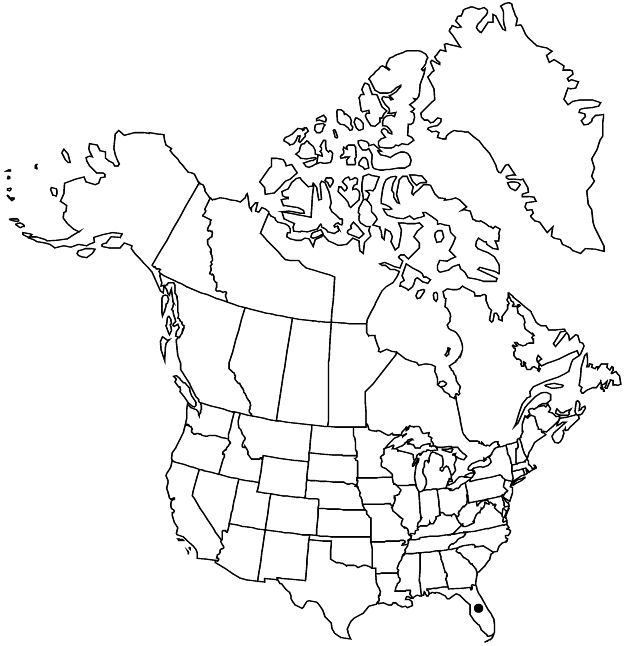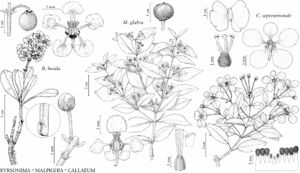Difference between revisions of "Byrsonima lucida"
Prodr. 1: 580. 1824.
FNA>Volume Importer |
FNA>Volume Importer |
||
| Line 19: | Line 19: | ||
|name=Byrsonima biflora | |name=Byrsonima biflora | ||
|authority=Grisebach | |authority=Grisebach | ||
| − | }}{{Treatment/ID/Synonym | + | }} {{Treatment/ID/Synonym |
|name=B. cuneata | |name=B. cuneata | ||
|authority=(Turczaninow) P. Wilson | |authority=(Turczaninow) P. Wilson | ||
| − | }}{{Treatment/ID/Synonym | + | }} {{Treatment/ID/Synonym |
|name=M. cuneata | |name=M. cuneata | ||
|authority=Turczaninow | |authority=Turczaninow | ||
| Line 40: | Line 40: | ||
|elevation=0–10 m. | |elevation=0–10 m. | ||
|distribution=Fla.;West Indies (Bahamas;Greater Antilles;Lesser Antilles;Virgin Islands). | |distribution=Fla.;West Indies (Bahamas;Greater Antilles;Lesser Antilles;Virgin Islands). | ||
| − | |discussion=<p>Byrsonima lucida, native in the flora area only to Miami-Dade and Monroe counties, is widely cultivated in peninsular Florida as an ornamental shrub; it probably has little or no tolerance for frost or temperatures below freezing.</p> | + | |discussion=<p><i>Byrsonima lucida</i>, native in the flora area only to Miami-Dade and Monroe counties, is widely cultivated in peninsular Florida as an ornamental shrub; it probably has little or no tolerance for frost or temperatures below freezing.</p> |
|tables= | |tables= | ||
|references= | |references= | ||
| Line 64: | Line 64: | ||
|publication year=1824 | |publication year=1824 | ||
|special status=Selected by author to be illustrated | |special status=Selected by author to be illustrated | ||
| − | |source xml=https://jpend@bitbucket.org/aafc-mbb/fna-data-curation.git/src/ | + | |source xml=https://jpend@bitbucket.org/aafc-mbb/fna-data-curation.git/src/8f726806613d60c220dc4493de13607dd3150896/coarse_grained_fna_xml/V12/V12_721.xml |
|genus=Byrsonima | |genus=Byrsonima | ||
|species=Byrsonima lucida | |species=Byrsonima lucida | ||
Revision as of 15:49, 18 September 2019
Shrubs or trees, 1–6 m. Leaves often clustered at tips of shoots; blade obovate, larger blades 20–30 × 9–19(–24) mm, base cuneate or gradually narrowed, apex rounded or obtuse, surfaces very sparsely sericeous to soon glabrate. Inflorescences 2.5–5 cm, 6–10(–16)-flowered. Pedicels straight in bud, somewhat decurved in fruit. Flowers: anthers glabrous, locules rounded at apex, connectives equaling or exceeding locules to 0.3 mm; ovary glabrous. Drupes 8–12 mm diam. (dried), ovoid to spheroid with short apical beak when immature, glabrous.
Phenology: Flowering most commonly Jan–Jun; fruiting Feb–Jul.
Habitat: Hammocks in dry rocky pinelands and sandy palm-pine woods.
Elevation: 0–10 m.
Distribution

Fla., West Indies (Bahamas, Greater Antilles, Lesser Antilles, Virgin Islands).
Discussion
Byrsonima lucida, native in the flora area only to Miami-Dade and Monroe counties, is widely cultivated in peninsular Florida as an ornamental shrub; it probably has little or no tolerance for frost or temperatures below freezing.
Selected References
None.
